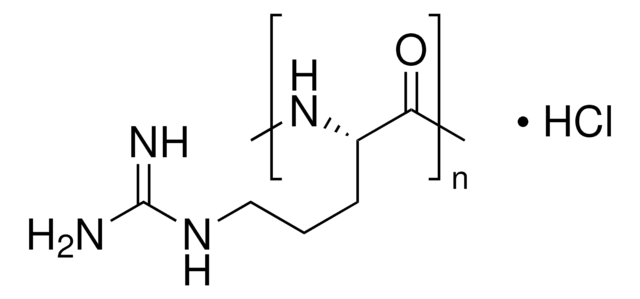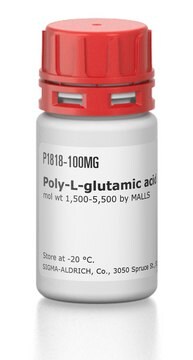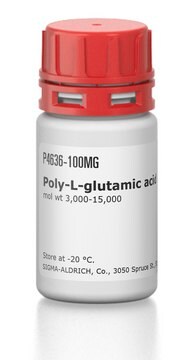P6516
Poly-L-Lysin -hydrobromid
suitable for cell culture, Mol wt ≤15,000 by MALLS
Synonym(e):
L-Lysine homopolymer hydrobromide
About This Item
Empfohlene Produkte
product name
Poly-L-Lysin -hydrobromid, mol wt 4,000-15,000 by viscosity
Form
solid
Qualitätsniveau
Mol-Gew.
≤15,000 by MALLS
4,000-15,000 by viscosity
Grünere Alternativprodukt-Bewertung
old score: 51
new score: 43
Find out more about DOZN™ Scoring
Grünere Alternativprodukt-Eigenschaften
Designing Safer Chemicals
Safer Solvents and Auxiliaries
Reduce Derivatives
Learn more about the Principles of Green Chemistry.
sustainability
Greener Alternative Product
Methode(n)
cell culture | mammalian: suitable
Farbe
white to off-white
Anwendung(en)
cell analysis
Grünere Alternativprodukt-Kategorie
Lagertemp.
−20°C
SMILES String
Cl.NCCCCC(N)C(O)=O
InChI
1S/C18H38N6O4/c19-10-4-1-7-13(22)16(25)23-14(8-2-5-11-20)17(26)24-15(18(27)28)9-3-6-12-21/h13-15H,1-12,19-22H2,(H,23,25)(H,24,26)(H,27,28)/t13-,14-,15-/m0/s1
InChIKey
WBSCNDJQPKSPII-KKUMJFAQSA-N
Suchen Sie nach ähnlichen Produkten? Aufrufen Leitfaden zum Produktvergleich
Allgemeine Beschreibung
Anwendung
- as a component of polyplexes and in DNA condensation experiments
- for coating circular mica disks for atomic force microscopy studies and SuperFrost glass slides for immunofluorescence studies of in HL-60 cells
- as a reference standard for generating calibration curve for the quantification of ε- Poly-L-lysine
Biochem./physiol. Wirkung
Komponenten
Vorsicht
Angaben zur Herstellung
Lagerklassenschlüssel
11 - Combustible Solids
WGK
WGK 3
Flammpunkt (°F)
Not applicable
Flammpunkt (°C)
Not applicable
Persönliche Schutzausrüstung
Eyeshields, Gloves, type N95 (US)
Analysenzertifikate (COA)
Suchen Sie nach Analysenzertifikate (COA), indem Sie die Lot-/Chargennummer des Produkts eingeben. Lot- und Chargennummern sind auf dem Produktetikett hinter den Wörtern ‘Lot’ oder ‘Batch’ (Lot oder Charge) zu finden.
Besitzen Sie dieses Produkt bereits?
In der Dokumentenbibliothek finden Sie die Dokumentation zu den Produkten, die Sie kürzlich erworben haben.
Kunden haben sich ebenfalls angesehen
Artikel
Kanjiro Miyata (The University of Tokyo, Japan) provides insights on the rational design of polymeric materials for “smart” oligonucleotide delivery.
Unser Team von Wissenschaftlern verfügt über Erfahrung in allen Forschungsbereichen einschließlich Life Science, Materialwissenschaften, chemischer Synthese, Chromatographie, Analytik und vielen mehr..
Setzen Sie sich mit dem technischen Dienst in Verbindung.





